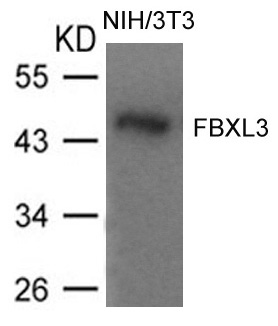
| WB | 咨询技术 | Human,Mouse,Rat |
| IF | 咨询技术 | Human,Mouse,Rat |
| IHC | 咨询技术 | Human,Mouse,Rat |
| ICC | 技术咨询 | Human,Mouse,Rat |
| FCM | 咨询技术 | Human,Mouse,Rat |
| Elisa | 咨询技术 | Human,Mouse,Rat |
| Aliases | FBK; Ovtm; FBXL3; Fbl3a; AU041772 |
| Entrez GeneID | 50789; |
| WB Predicted band size | 49kDa |
| Host/Isotype | Rabbit IgG |
| Antibody Type | Primary antibody |
| Storage | Store at 4°C short term. Aliquot and store at -20°C long term. Avoid freeze/thaw cycles. |
| Species Reactivity | Mouse |
| Immunogen | Peptide sequence around aa.1~5 (M-K-R-G-G) derived from mouse FBXL3 |
| Formulation | Purified antibody in PBS with 0.05% sodium azide. |
+ +
以下是关于FBXL3抗体的3篇参考文献的简要列举(文献名称、作者及摘要概括):
---
1. **文献名称**: *Circadian mutant Overtime reveals F-box protein FBXL3 regulation of cryptochrome and period gene expression*
**作者**: Siepka SM, et al.
**摘要**: 该研究通过遗传筛选发现,FBXL3作为SCF泛素连接酶复合体的关键组分,通过靶向降解生物钟核心蛋白CRY1/2调控哺乳动物昼夜节律周期。文中使用FBXL3抗体进行免疫沉淀实验,证实其与CRY蛋白的直接互作。
---
2. **文献名称**: *Structural and functional analysis of FBXL3 as a substrate-recognition component of the SCF ubiquitin ligase complex*
**作者**: Hirano A, et al.
**摘要**: 本研究解析了FBXL3的晶体结构,揭示其通过C端结构域特异性识别CRY蛋白的分子机制。利用FBXL3抗体进行蛋白质定位实验,发现其在细胞核内富集,支持其参与CRY蛋白泛素化降解的生理功能。
---
3. **文献名称**: *SCF^(FBXL3) ubiquitin ligase targets cryptochromes at their cofactor pocket*
**作者**: Yoo SH, et al.
**摘要**: 文章证明FBXL3通过结合CRY蛋白的黄素辅因子结合口袋,介导其泛素化及蛋白酶体降解。通过FBXL3抗体的Western blot分析,发现其表达水平与CRY蛋白稳定性呈负相关,揭示了生物钟负反馈调控的关键步骤。
---
如需具体文献链接或补充说明,可进一步提供信息。
The FBXL3 antibody is a crucial tool for studying the F-box and leucine-rich repeat protein 3 (FBXL3), a substrate-recognition component of the Skp1-Cullin-F-box (SCF) ubiquitin ligase complex. FBXL3 plays a pivotal role in the ubiquitin-proteasome system, targeting specific proteins for degradation to regulate cellular processes such as circadian rhythms, cell cycle progression, and DNA damage response. Notably, FBXL3 is recognized for its role in modulating the mammalian circadian clock by promoting the degradation of cryptochrome (CRY) proteins, which are core repressors of the circadian transcriptional machinery.
Antibodies against FBXL3 are widely used in research to detect and quantify FBXL3 expression via techniques like Western blotting, immunofluorescence, and immunoprecipitation. These antibodies help elucidate FBXL3's interaction partners, post-translational modifications, and tissue-specific expression patterns. Validation often includes assays using FBXL3 knockout cells or tissues to confirm specificity.
The development and application of FBXL3 antibodies have advanced studies on circadian rhythm disorders, cancer (where FBXL3 may act as an oncogene or tumor suppressor), and neurodegenerative diseases linked to protein stability dysregulation. High-quality, well-validated antibodies are essential to ensure reproducibility in exploring FBXL3's multifaceted roles in health and disease.
×